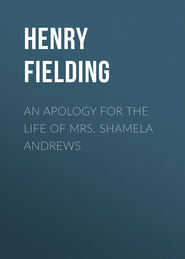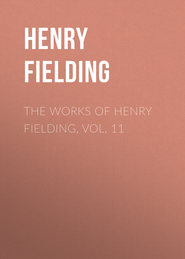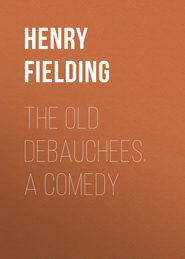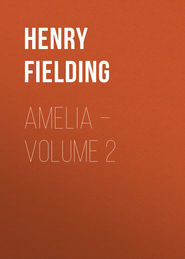По всем вопросам обращайтесь на: info@litportal.ru
(©) 2003-2024.
✖
Amelia – Volume 1
Настройки чтения
Размер шрифта
Высота строк
Поля
"Nothing remarkable, as I remember, happened during our stay at Paris, which we left soon after and came to London. Here we rested only two days, and then, taking leave of our fellow-travellers, we set out for Wiltshire, my wife being so impatient to see the child which she had left behind her, that the child she carried with her was almost killed with the fatigue of the journey.
"We arrived at our inn late in the evening. Amelia, though she had no great reason to be pleased with any part of her sister's behaviour, resolved to behave to her as if nothing wrong had ever happened. She therefore sent a kind note to her the moment of our arrival, giving her her option, whether she would come to us at the inn, or whether we should that evening wait on her. The servant, after waiting an hour, brought us an answer, excusing her from coming to us so late, as she was disordered with a cold, and desiring my wife by no means to think of venturing out after the fatigue of her journey; saying, she would, on that account, defer the great pleasure of seeing her till the morning, without taking any more notice of your humble servant than if no such person had been in the world, though I had very civilly sent my compliments to her. I should not mention this trifle, if it was not to shew you the nature of the woman, and that it will be a kind of key to her future conduct.
"When the servant returned, the good doctor, who had been with us almost all the time of his absence, hurried us away to his house, where we presently found a supper and a bed prepared for us. My wife was eagerly desirous to see her child that night; but the doctor would not suffer it; and, as he was at nurse at a distant part of the town, and the doctor assured her he had seen him in perfect health that evening, she suffered herself at last to be dissuaded.
"We spent that evening in the most agreeable manner; for the doctor's wit and humour, joined to the highest chearfulness and good nature, made him the most agreeable companion in the world: and he was now in the highest spirits, which he was pleased to place to our account. We sat together to a very late hour; for so excellent is my wife's constitution, that she declared she was scarce sensible of any fatigue from her late journeys.
"Amelia slept not a wink all night, and in the morning early the doctor accompanied us to the little infant. The transports we felt on this occasion were really enchanting, nor can any but a fond parent conceive, I am certain, the least idea of them. Our imaginations suggested a hundred agreeable circumstances, none of which had, perhaps, any foundation. We made words and meaning out of every sound, and in every feature found out some resemblance to my Amelia, as she did to me.
"But I ask your pardon for dwelling on such incidents, and will proceed to scenes which, to most persons, will be more entertaining.
"We went hence to pay a visit to Miss Harris, whose reception of us was, I think, truly ridiculous; and, as you know the lady, I will endeavour to describe it particularly. At our first arrival we were ushered into a parlour, where we were suffered to wait almost an hour. At length the lady of the house appeared in deep mourning, with a face, if possible, more dismal than her dress, in which, however, there was every appearance of art. Her features were indeed skrewed up to the very height of grief. With this face, and in the most solemn gait, she approached Amelia, and coldly saluted her. After which she made me a very distant formal courtesy, and we all sat down. A short silence now ensued, which Miss Harris at length broke with a deep sigh, and said, 'Sister, here is a great alteration in this place since you saw it last; Heaven hath been pleased to take my poor mother to itself.' – (Here she wiped her eyes, and then continued.) – 'I hope I know my duty, and have learned a proper resignation to the divine will; but something is to be allowed to grief for the best of mothers; for so she was to us both; and if at last she made any distinction, she must have had her reasons for so doing. I am sure I can truly say I never wished, much less desired it.' The tears now stood in poor Amelia's eyes; indeed, she had paid too many already for the memory of so unnatural a parent. She answered, with the sweetness of an angel, that she was far from blaming her sister's emotions on so tender an occasion; that she heartily joined with her in her grief; for that nothing which her mother had done in the latter part of her life could efface the remembrance of that tenderness which she had formerly shewn her. Her sister caught hold of the word efface, and rung the changes upon it. – 'Efface!' cried she, 'O Miss Emily (for you must not expect me to repeat names that will be for ever odious), I wish indeed everything could be effaced. – Effaced! O that that was possible! we might then have still enjoyed my poor mother; for I am convinced she never recovered her grief on a certain occasion.' – Thus she ran on, and, after many bitter strokes upon her sister, at last directly charged her mother's death on my marriage with Amelia. I could be silent then no longer. I reminded her of the perfect reconciliation between us before my departure, and the great fondness which she expressed for me; nor could I help saying, in very plain terms, that if she had ever changed her opinion of me, as I was not conscious of having deserved such a change by my own behaviour, I was well convinced to whose good offices I owed it. Guilt hath very quick ears to an accusation. Miss Harris immediately answered to the charge. She said, such suspicions were no more than she expected; that they were of a piece with every other part of my conduct, and gave her one consolation, that they served to account for her sister Emily's unkindness, as well to herself as to her poor deceased mother, and in some measure lessened the guilt of it with regard to her, since it was not easy to know how far a woman is in the power of her husband. My dear Amelia reddened at this reflection on me, and begged her sister to name any single instance of unkindness or disrespect in which she had ever offended. To this the other answered (I am sure I repeat her words, though I cannot mimic either the voice or air with which they were spoken) – 'Pray, Miss Emily, which is to be the judge, yourself or that gentleman? I remember the time when I could have trusted to your judgment in any affair; but you are now no longer mistress of yourself, and are not answerable for your actions. Indeed, it is my constant prayer that your actions may not be imputed to you. It was the constant prayer of that blessed woman, my dear mother, who is now a saint above; a saint whose name I can never mention without a tear, though I find you can hear it without one. I cannot help observing some concern on so melancholy an occasion; it seems due to decency; but, perhaps (for I always wish to excuse you) you are forbid to cry.' The idea of being bid or forbid to cry struck so strongly on my fancy, that indignation only could have prevented me from laughing. But my narrative, I am afraid, begins to grow tedious. In short, after hearing, for near an hour, every malicious insinuation which a fertile genius could invent, we took our leave, and separated as persons who would never willingly meet again.
"The next morning after this interview Amelia received a long letter from Miss Harris; in which, after many bitter invectives against me, she excused her mother, alledging that she had been driven to do as she did in order to prevent Amelia's ruin, if her fortune had fallen into my hands. She likewise very remotely hinted that she would be only a trustee for her sister's children, and told her that on one condition only she would consent to live with her as a sister. This was, if she could by any means be separated from that man, as she was pleased to call me, who had caused so much mischief in the family.
"I was so enraged at this usage, that, had not Amelia intervened, I believe I should have applied to a magistrate for a search-warrant for that picture, which there was so much reason to suspect she had stolen; and which I am convinced, upon a search, we should have found in her possession."
"Nay, it is possible enough," cries Miss Matthews; "for I believe there is no wickedness of which the lady is not capable."
"This agreeable letter was succeeded by another of the like comfortable kind, which informed me that the company in which I was, being an additional one raised in the beginning of the war, was reduced; so that I was now a lieutenant on half-pay.
"Whilst we were meditating on our present situation the good doctor came to us. When we related to him the manner in which my sister had treated us, he cried out, 'Poor soul! I pity her heartily;' for this is the severest resentment he ever expresses; indeed, I have often heard him say that a wicked soul is the greatest object of compassion in the world." – A sentiment which we shall leave the reader a little time to digest.
Chapter xii.
In which Mr. Booth concludes his story
"The next day the doctor set out for his parsonage, which was about thirty miles distant, whither Amelia and myself accompanied him, and where we stayed with him all the time of his residence there, being almost three months.
"The situation of the parish under my good friend's care is very pleasant. It is placed among meadows, washed by a clear trout-stream, and flanked on both sides with downs. His house, indeed, would not much attract the admiration of the virtuoso. He built it himself, and it is remarkable only for its plainness; with which the furniture so well agrees, that there is no one thing in it that may not be absolutely necessary, except books, and the prints of Mr. Hogarth, whom he calls a moral satirist.
"Nothing, however, can be imagined more agreeable than the life that the doctor leads in this homely house, which he calls his earthly paradise. All his parishioners, whom he treats as his children, regard him as their common father. Once in a week he constantly visits every house in the parish, examines, commends, and rebukes, as he finds occasion. This is practised likewise by his curate in his absence; and so good an effect is produced by this their care, that no quarrels ever proceed either to blows or law-suits; no beggar is to be found in the whole parish; nor did I ever hear a very profane oath all the time I lived in it. "But to return from so agreeable a digression, to my own affairs, that are much less worth your attention. In the midst of all the pleasures I tasted in this sweet place and in the most delightful company, the woman and man whom I loved above all things, melancholy reflexions concerning my unhappy circumstances would often steal into my thoughts. My fortune was now reduced to less than forty pounds a-year; I had already two children, and my dear Amelia was again with child.
"One day the doctor found me sitting by myself, and employed in melancholy contemplations on this subject. He told me he had observed me growing of late very serious; that he knew the occasion, and neither wondered at nor blamed me. He then asked me if I had any prospect of going again into the army; if not, what scheme of life I proposed to myself?
"I told him that, as I had no powerful friends, I could have but little expectations in a military way; that I was as incapable of thinking of any other scheme, as all business required some knowledge or experience, and likewise money to set up with; of all which I was destitute.
"'You must know then, child,' said the doctor, 'that I have been thinking on this subject as well as you; for I can think, I promise you, with a pleasant countenance.' These were his words. 'As to the army, perhaps means might be found of getting you another commission; but my daughter seems to have a violent objection to it; and to be plain, I fancy you yourself will find no glory make you amends for your absence from her. And for my part,' said he, 'I never think those men wise who, for any worldly interest, forego the greatest happiness of their lives. If I mistake not,' says he, 'a country life, where you could be always together, would make you both much happier people.'
"I answered, that of all things I preferred it most; and I believed Amelia was of the same opinion.
"The doctor, after a little hesitation, proposed to me to turn farmer, and offered to let me his parsonage, which was then become vacant. He said it was a farm which required but little stock, and that little should not be wanting.
"I embraced this offer very eagerly, and with great thankfulness, and immediately repaired to Amelia to communicate it to her, and to know her sentiments.
"Amelia received the news with the highest transports of joy; she said that her greatest fear had always been of my entring again into the army. She was so kind as to say that all stations of life were equal to her, unless as one afforded her more of my company than another. 'And as to our children,' said she, 'let us breed them up to an humble fortune, and they will be contented with it; for none,' added my angel, 'deserve happiness, or, indeed, are capable of it, who make any particular station a necessary ingredient.'"
"Thus, madam, you see me degraded from my former rank in life; no longer Captain Booth, but farmer Booth at your service.
"During my first year's continuance in this new scene of life, nothing, I think, remarkable happened; the history of one day would, indeed, be the history of the whole year."
"Well, pray then," said Miss Matthews, "do let us hear the history of that day; I have a strange curiosity to know how you could kill your time; and do, if possible, find out the very best day you can."
"If you command me, madam," answered Booth, "you must yourself be accountable for the dulness of the narrative. Nay, I believe, you have imposed a very difficult task on me; for the greatest happiness is incapable of description.
"I rose then, madam – "
"O, the moment you waked, undoubtedly," said Miss Matthews.
"Usually," said he, "between five and six."
"I will have no usually," cried Miss Matthews, "you are confined to a day, and it is to be the best and happiest in the year."
"Nay, madam," cries Booth, "then I must tell you the day in which Amelia was brought to bed, after a painful and dangerous labour; for that I think was the happiest day of my life."
"I protest," said she, "you are become farmer Booth, indeed. What a happiness have you painted to my imagination! you put me in mind of a newspaper, where my lady such-a-one is delivered of a son, to the great joy of some illustrious family."
"Why then, I do assure you, Miss Matthews," cries Booth, "I scarce know a circumstance that distinguished one day from another. The whole was one continued series of love, health, and tranquillity. Our lives resembled a calm sea." —
"The dullest of all ideas," cries the lady.
"I know," said he, "it must appear dull in description, for who can describe the pleasures which the morning air gives to one in perfect health; the flow of spirits which springs up from exercise; the delights which parents feel from the prattle and innocent follies of their children; the joy with which the tender smile of a wife inspires a husband; or lastly, the chearful, solid comfort which a fond couple enjoy in each other's conversation? – All these pleasures and every other of which our situation was capable we tasted in the highest degree. Our happiness was, perhaps, too great; for fortune seemed to grow envious of it, and interposed one of the most cruel accidents that could have befallen us by robbing us of our dear friend the doctor."
"I am sorry for it," said Miss Matthews. "He was indeed a valuable man, and I never heard of his death before."
"Long may it be before any one hears of it!" cries Booth. "He is, indeed, dead to us; but will, I hope, enjoy many happy years of life. You know, madam, the obligations he had to his patron the earl; indeed, it was impossible to be once in his company without hearing of them. I am sure you will neither wonder that he was chosen to attend the young lord in his travels as his tutor, nor that the good man, however disagreeable it might be (as in fact it was) to his inclination, should comply with the earnest request of his friend and patron.
"By this means I was bereft not only of the best companion in the world, but of the best counsellor; a loss of which I have since felt the bitter consequence; for no greater advantage, I am convinced, can arrive to a young man, who hath any degree of understanding, than an intimate converse with one of riper years, who is not only able to advise, but who knows the manner of advising. By this means alone, youth can enjoy the benefit of the experience of age, and that at a time of life when such experience will be of more service to a man than when he hath lived long enough to acquire it of himself.
"From want of my sage counsellor, I now fell into many errors. The first of these was in enlarging my business, by adding a farm of one hundred a year to the parsonage, in renting which I had also as bad a bargain as the doctor had before given me a good one. The consequence of which was, that whereas, at the end of the first year, I was worth upwards of fourscore pounds; at the end of the second I was near half that sum worse (as the phrase is) than nothing.
"A second folly I was guilty of in uniting families with the curate of the parish, who had just married, as my wife and I thought, a very good sort of a woman. We had not, however, lived one month together before I plainly perceived this good sort of a woman had taken a great prejudice against my Amelia, for which, if I had not known something of the human passions, and that high place which envy holds among them, I should not have been able to account, for, so far was my angel from having given her any cause of dislike, that she had treated her not only with civility, but kindness.
"Besides superiority in beauty, which, I believe, all the world would have allowed to Amelia, there was another cause of this envy, which I am almost ashamed to mention, as it may well be called my greatest folly. You are to know then, madam, that from a boy I had been always fond of driving a coach, in which I valued myself on having some skill. This, perhaps, was an innocent, but I allow it to have been a childish vanity. As I had an opportunity, therefore, of buying an old coach and harness very cheap (indeed they cost me but twelve pounds), and as I considered that the same horses which drew my waggons would likewise draw my coach, I resolved on indulging myself in the purchase.
"The consequence of setting up this poor old coach is inconceivable. Before this, as my wife and myself had very little distinguished ourselves from the other farmers and their wives, either in our dress or our way of living, they treated us as their equals; but now they began to consider us as elevating ourselves into a state of superiority, and immediately began to envy, hate, and declare war against us. The neighbouring little squires, too, were uneasy to see a poor renter become their equal in a matter in which they placed so much dignity; and, not doubting but it arose in me from the same ostentation, they began to hate me likewise, and to turn my equipage into ridicule, asserting that my horses, which were as well matched as any in the kingdom, were of different colours and sizes, with much more of that kind of wit, the only basis of which is lying.
"But what will appear most surprizing to you, madam, was, that the curate's wife, who, being lame, had more use of the coach than my Amelia (indeed she seldom went to church in any other manner), was one of my bitterest enemies on the occasion. If she had ever any dispute with Amelia, which all the sweetness of my poor girl could not sometimes avoid, she was sure to introduce with a malicious sneer, 'Though my husband doth not keep a coach, madam.' Nay, she took this opportunity to upbraid my wife with the loss of her fortune, alledging that some folks might have had as good pretensions to a coach as other folks, and a better too, as they brought a better fortune to their husbands, but that all people had not the art of making brick without straw.
"You will wonder, perhaps, madam, how I can remember such stuff, which, indeed, was a long time only matter of amusement to both Amelia and myself; but we at last experienced the mischievous nature of envy, and that it tends rather to produce tragical than comical events. My neighbours now began to conspire against me. They nicknamed me in derision, the Squire Farmer. Whatever I bought, I was sure to buy dearer, and when I sold I was obliged to sell cheaper, than any other. In fact, they were all united, and, while they every day committed trespasses on my lands with impunity, if any of my cattle escaped into their fields, I was either forced to enter into a law-suit or to make amends fourfold for the damage sustained.
"The consequences of all this could be no other than that ruin which ensued. Without tiring you with particulars, before the end of four years I became involved in debt near three hundred pounds more than the value of all my effects. My landlord seized my stock for rent, and, to avoid immediate confinement in prison, I was forced to leave the country with all that I hold dear in the world, my wife and my poor little family.
"In this condition I arrived in town five or six days ago. I had just taken a lodging in the verge of the court, and had writ my dear Amelia word where she might find me, when she had settled her affairs in the best manner she could. That very evening, as I was returning home from a coffee-house, a fray happening in the street, I endeavoured to assist the injured party, when I was seized by the watch, and, after being confined all night in the round-house, was conveyed in the morning before a justice of peace, who committed me hither; where I should probably have starved, had I not from your hands found a most unaccountable preservation. – And here, give me leave to assure you, my dear Miss Matthews, that, whatever advantage I may have reaped from your misfortune, I sincerely lament it; nor would I have purchased any relief to myself at the price of seeing you in this dreadful place."
He spake these last words with great tenderness; for he was a man of consummate good nature, and had formerly had much affection for this young lady; indeed, more than the generality of people are capable of entertaining for any person whatsoever.
BOOK IV












